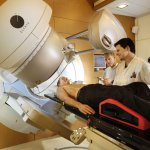
News • AI vs. NSCLC
Streamlining lung cancer radiotherapy with Deep Learning
UK researchers developed and validated a deep learning algorithm that can identify and outline a non-small cell lung cancer (NSCLC) tumor on a CT scan within seconds.

UK researchers developed and validated a deep learning algorithm that can identify and outline a non-small cell lung cancer (NSCLC) tumor on a CT scan within seconds.

A different way of treating people with prostate cancer will be investigated by researchers at the University of Leeds in a new clinical trial funded by Yorkshire Cancer Research.

A new research venture pairs cutting-edge particle accelerator science and radiation therapy.

Researchers have succeeded in using metal oxide nanoparticles as "radiosensitizers" – and in producing them on an industrial scale.

Molecular radiotherapy shows great potential in becoming a more mainstream treatment for cancer, but the field is being hampered by a limited radionuclide supply.

GenesisCare announced the establishment of the Accuray CyberKnife S7 robotic accelerator that delivers radiosurgery treatment guided by AI and synchronized with real-time imaging.

Light therapy may accelerate the healing of skin damage from radiation therapy by up to 50%, according to a recent University at Buffalo-led study.

Prostate cancer specialists from the Radiotherapy Department at Norfolk and Norwich University Hospitals Foundation Trust have become the first in the world to use an innovative technique to help patients receiving treatment for prostate cancer. Some patients receiving radiotherapy for prostate cancer will have their treatment split into two portions. The first stage of killing the cancerous…

The Netherlands Cancer Institute, University of Amsterdam (UvA), and Elekta will collaborate on the development of new AI strategies for the further improvement of precision radiotherapy. This concerns the personalization of treatment by improving the quality of imaging used during treatment, predicting and accounting for changes in the patient’s anatomy over time, and automatically adapting…

Research from Cleveland Clinic in the U.S. and Cleveland Clinic Abu Dhabi in the U.A.E. has found a decrease in patient survival rates when treatment options – surgery, chemotherapy and radiation – are completed more than 38 weeks from the time of diagnosis. The observational study, which included more than 28,000 breast cancer patients registered in the American National Cancer Database, is…

A breast cancer therapy that requires just one shot of radiotherapy is as effective as traditional radiotherapy, and avoids potential damage to nearby organs, according to a paper by UCL experts.

For many patients with localized lung cancer (non-small-cell lung carcinoma and small cell lung carcinoma), high-dose radiation with concurrent chemotherapy is a potential cure. Yet this treatment can cause severe, acute inflammation of the esophagus (esophagitis) in about one in five patients, requiring hospitalization and placement of a feeding tube. A team of radiation oncologists at Mass…

Researchers at the Helmholtz-Zentrum Dresden-Rossendorf (HZDR) want to build the world’s first prototype that tracks moving tumors with magnetic resonance imaging (MRI) in real time during proton therapy. They are combining a rotating open MRI device, designed for the LINAC-MR system from Alberta Health Services, with an actively scanned clinical-akin proton beam at OncoRay, the Dresden-based…

Lung tumors are home to immune cells that affect their growth and resistance to treatment. Looking at neutrophils, scientists led by EPFL have discovered that the key might lie in the cells’ ability to metabolize glucose, opening an entirely new target for improving radiotherapy.

Clinical audit within radiology departments can help promote high quality medical care and improve patient experience, as well as provide educational and teaching opportunities. Aiming to see consistent delivery across Europe, clinical audit is currently under the initiative ‘Diagnostic and Interventional Radiology, Radiotherapy, and Nuclear medicine including Therapies’. The latest project…

A radiotherapy technique which ‘paints’ tumours by targeting them precisely, and avoiding healthy tissue, has been devised in research led by the University of Strathclyde. Researchers used a magnetic lens to focus a Very High Electron Energy (VHEE) beam to a zone of a few millimetres. Concentrating the radiation into a small volume of high dose will enable it to be rapidly scanned across a…

Doctors at Addenbrooke’s Hospital in Cambridge aim to drastically cut cancer waiting times by using artificial intelligence (AI) to automate lengthy radiotherapy preparations. The AI technology, known as InnerEye, is the result of an eight-year collaboration between researchers at Cambridge-based Microsoft Research, Addenbrooke’s Hospital and the University of Cambridge.

To target ionised radiation as precisely as possible, imaging a tumour is vital in radiotherapy planning. ‘Today, imaging is used increasingly during the therapy itself,’ explained Professor Mark Ladd during the 51st annual meeting of the German Society for Medical Physics (DGMP).

Prostate cancer radiotherapy treatments guided by MRI are increasingly being explored to help improve patient outcomes and reduce toxicities after treatment. However, this development is being held back as the MRI approach is labour intensive and requires daily adaptive treatment planning, placing significant additional demands on clinician time and oncology services. To address this, a team of…

Dosimetry specialist PTW Freiburg GmbH signed a collaboration agreement with The Netherlands Cancer Institute – Antoni van Leeuwenhoek Hospital (NKI-AVL, Amsterdam) to jointly develop an advanced EPID-based dosimetry solution for automated patient-specific quality assurance in radiotherapy. The new software module RT EPID, which will become part of PTW’s patient QA platform Veriqa, builds on…

The dosimetry specialist PTW Freiburg GmbH has entered into a collaboration with the US-based bioinformatics company Radialogica LLC to integrate their advanced SciMoCa Monte Carlo dose calculation algorithm into PTW’s patient QA platform Veriqa. The new Veriqa module RT MonteCarlo 3D, which uses the SciMoCa dose engine for calculation-based radiotherapy plan verification, has received CE mark…

For most women with early breast cancer, a single dose of targeted radiotherapy during surgery is just as effective as conventional radiotherapy, which requires several visits to hospital after surgery. This combination of targeted radiotherapy (restricted to the area around the tumour) given immediately after surgery is called targeted intraoperative radiotherapy. Conventional radiotherapy…

The COVID-19 pandemic has affected virtually every aspect of healthcare provision - cancer care is no exception. In fact, during the pandemic, patients with cancer represent a high-risk group. Recent studies estimate that delays in cancer diagnosis and treatment will increase the indirect death toll of COVID-19 by several thousands in the coming years.

More than half of all cancer patients undergo radiation therapy and the dose is critical. Too much and the surrounding tissue gets damaged, too little and the cancer cells survive. Subhadeep Dutta and Karthik Pushpavanam, graduate students working in the lab of Kaushal Rege, Professor at Arizona State University in Tempe, and collaborators at Banner-M.D. Anderson in Gilbert, Arizona, developed a…

A technique that enables patients suffering from heart conditions to hold their breath safely for over 5 minutes could have potential as part of a new treatment for cardiac arrhythmias, say researchers at the University of Birmingham. In a new study, published in Frontiers in Physiology, researchers initially proposed the technique as a new means for earlier diagnosis of ischaemic heart disease.…